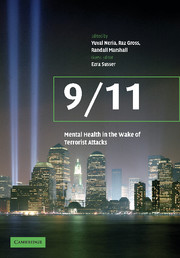Book contents
- Frontmatter
- Contents
- Acknowledgments
- Editors brief bio
- List of contributors
- Foreword
- Part I Introduction
- Part II The psychological aftermath of 9/11
- Part III Reducing the burden: community response and community recovery
- Part IV Outreach and intervention in the wake of terrorist attacks
- Part IV A New York area
- 16 PTSD in urban primary care patients following 9/11
- 17 Project Liberty: responding to mental health needs after the World Trade Center terrorist attacks
- 18 Mental health services support in response to September 11: the central role of the Mental Health Association of New York City
- 19 The New York Consortium for Effective Trauma Treatment
- 20 Evaluation and treatment of firefighters and utility workers following the World Trade Center attacks
- 21 The World Trade Center Worker/Volunteer Mental Health Screening Program
- 22 Child and adolescent trauma treatments and services after September 11: implementing evidence-based practices into complex child services systems
- 23 Relationally and developmentally focused interventions with young children and their caregivers in the wake of terrorism and other violent experiences
- Part IV B Washington, DC
- Part IV C Prolonged-exposure treatment as a core resource for clinicians in the community: dissemination of trauma knowledge post-disaster
- Part V Disasters and mental health: perspectives on response and preparedness
- Index
18 - Mental health services support in response to September 11: the central role of the Mental Health Association of New York City
from Part IV A - New York area
Published online by Cambridge University Press: 27 October 2009
- Frontmatter
- Contents
- Acknowledgments
- Editors brief bio
- List of contributors
- Foreword
- Part I Introduction
- Part II The psychological aftermath of 9/11
- Part III Reducing the burden: community response and community recovery
- Part IV Outreach and intervention in the wake of terrorist attacks
- Part IV A New York area
- 16 PTSD in urban primary care patients following 9/11
- 17 Project Liberty: responding to mental health needs after the World Trade Center terrorist attacks
- 18 Mental health services support in response to September 11: the central role of the Mental Health Association of New York City
- 19 The New York Consortium for Effective Trauma Treatment
- 20 Evaluation and treatment of firefighters and utility workers following the World Trade Center attacks
- 21 The World Trade Center Worker/Volunteer Mental Health Screening Program
- 22 Child and adolescent trauma treatments and services after September 11: implementing evidence-based practices into complex child services systems
- 23 Relationally and developmentally focused interventions with young children and their caregivers in the wake of terrorism and other violent experiences
- Part IV B Washington, DC
- Part IV C Prolonged-exposure treatment as a core resource for clinicians in the community: dissemination of trauma knowledge post-disaster
- Part V Disasters and mental health: perspectives on response and preparedness
- Index
Summary
When the New York City (NYC) Department of Mental Health contracted with the Mental Health Association (MHA) of NYC in 1996 to start a new program called LifeNet, all parties believed that this multi-cultural, 24-hour, seven-day-a-week professional crisis, information, and referral hotline would become an essential vehicle for promoting access to treatment resources around the City. In doing so, they laid the foundation for mobilizing the largest mental health disaster response in the nation's history.
In addition to expanding the hotline's geographic reach beyond the five boroughs of NYC, LifeNet's extended role has encompassed aspects of professional training and outreach to businesses and community groups; central coordination of referrals for the Federal Emergency Management Agency (FEMA) funded counseling program, Project Liberty; and administration of an innovative program, funded jointly by the American Red Cross (ARC) and the September 11th Fund (SEF), for enabling access to mental health and substance treatment for “primary victims” of the disaster.
This chapter will discuss the various roles the MHA of NYC's LifeNet has played in the post-disaster recovery, and review the many lessons learned – thus far – in this ongoing effort.
LifeNet before the disaster
Lesson 1: Before a major disaster occurs, it is a major advantage to have a behavioral health hotline that is already performing functions that are useful following a disaster on a daily basis.
The success of LifeNet's post-disaster experience resulted from its pre-disaster history. By establishing a credible presence in the community prior to September 11th through building relationships with government agencies, law enforcement, social service provider networks, the media, and a multi-cultural public at large LifeNet was poised to take on the broad, multi-level spectrum of challenges unfolding in the wake of this unprecedented catastrophe.
- Type
- Chapter
- Information
- 9/11: Mental Health in the Wake of Terrorist Attacks , pp. 282 - 310Publisher: Cambridge University PressPrint publication year: 2006
- 3
- Cited by



